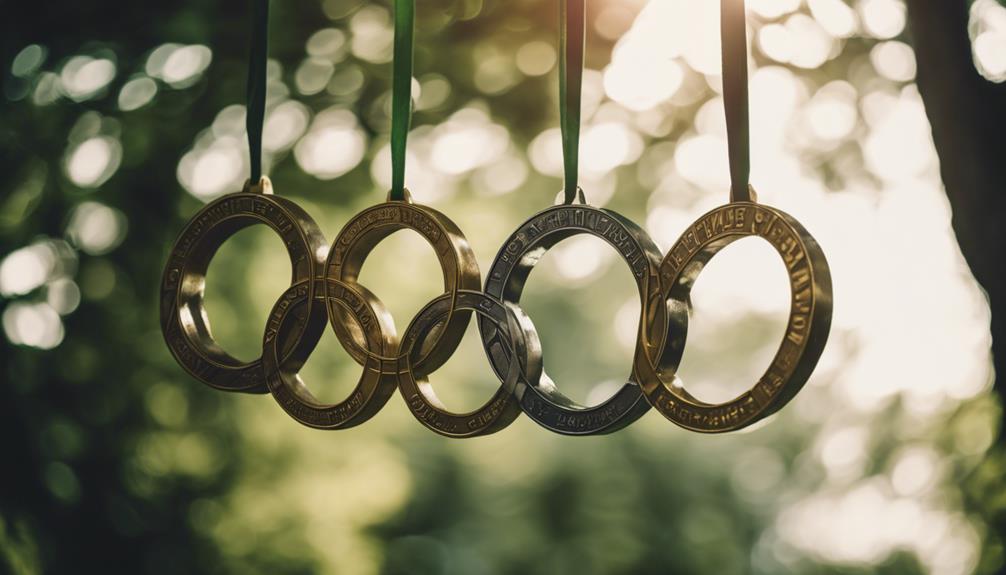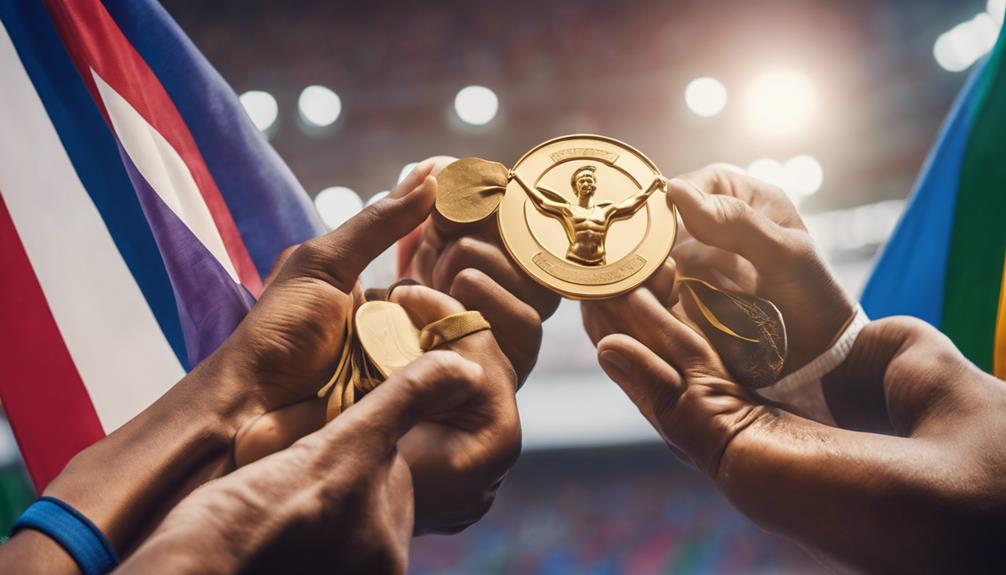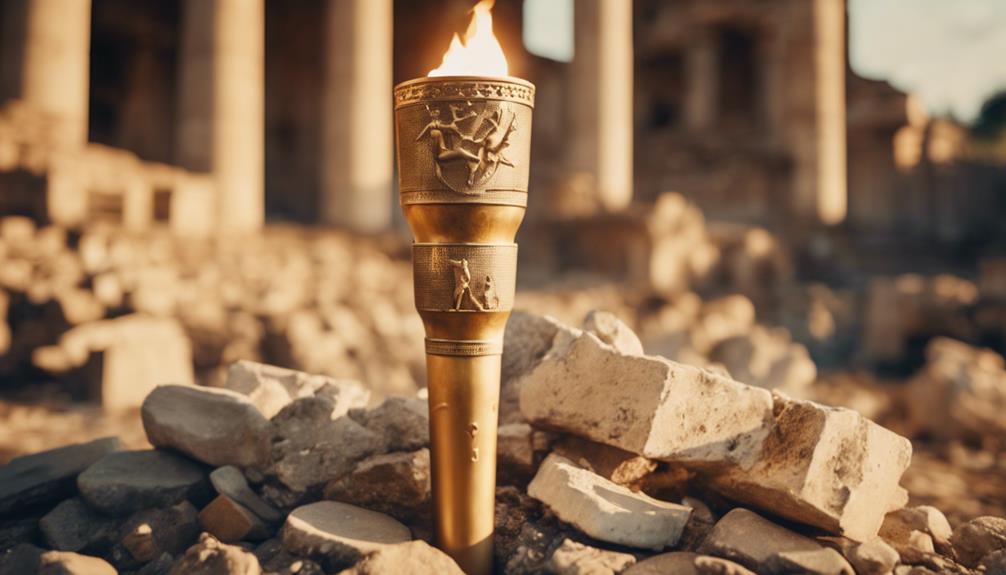The Olympics are not just about athletic feats; they're a rich blend of history, culture, and transformation. You'll find treasures like the ancient origins dating back to 776 BCE, where exclusivity emphasized Greek values. Events have expanded over time, showcasing inclusivity through women's competitions and diverse sports. The Olympic rings symbolize unity among nations, while hosting can boost local economies or lead to hidden costs. Controversial moments in history reflect society's evolving values and ethics. As you explore, you'll uncover how these stories shape the modern Games and their significance today.
Key Takeaways
- The first modern Olympics in 1896 featured only 13 countries and 43 events, highlighting its humble beginnings compared to today's expansive Games.
- The 1900 Paris Olympics included live pigeon shooting, a bizarre event that sparked outrage and reflected the era's differing values on sport.
- The tragic terrorist attack during the 1972 Munich Games remains a pivotal moment, showcasing the intersection of politics and athletics in Olympic history.
- The introduction of women's events in 1900 marked a significant step towards inclusivity, paving the way for greater gender representation in sports.
Ancient Origins of the Olympics
The ancient origins of the Olympics trace back to a single stadion footrace, where freeborn Greek men competed for glory in a celebration of athletic prowess and cultural pride. This inaugural event, around 776 BCE, spanned roughly 192 meters and took place in Olympia, marking the beginning of a tradition that would evolve over centuries.
Exclusivity defined these early games, as women were barred from both competing and observing. The focus was on showcasing physical strength and skill, reflecting the values of Greek society.
As you delve into this rich history, you'll uncover how this solitary race laid the groundwork for the multi-sport extravaganza we know today, capturing the essence of competition and unity among the ancient Greeks.
The Evolution of Olympic Events
Over time, Olympic events have expanded dramatically from a single footrace to a diverse array of competitions that showcase athleticism across multiple sports. You'll find everything from swimming and gymnastics to skateboarding and surfing, reflecting society's evolving interests.
Each new addition often mirrors contemporary trends, welcoming varied talents and promoting inclusivity. For instance, the introduction of women's events in 1900 marked a significant shift, allowing female athletes to shine on this grand stage.
The Olympic program continually adapts, ensuring it remains relevant and exciting for audiences worldwide. As you explore the Games, you'll witness how these changes highlight not only athletic prowess but also cultural progression, bringing together athletes from all backgrounds in a celebration of human achievement.
The Significance of Olympic Symbols

Olympic symbols, like the iconic rings, embody the spirit of unity and peace among nations, making them essential to the Games' identity. Each of the five rings represents a continent, creating a visual link between athletes from diverse backgrounds.
You can see how the colors were thoughtfully chosen from the flags of participating countries, ensuring inclusivity. This design not only reflects the Olympic values of friendship and cooperation but also serves as a reminder of the shared human experience.
When you see these rings, you're reminded of the collective effort and dedication athletes put forth. Understanding the significance of these symbols deepens your appreciation for the Games and the ideals they promote worldwide.
Economic Advantages of Hosting
Hosting the Olympics can create significant economic benefits for cities, boosting job creation and attracting tourists from around the world.
You'll see a surge in employment opportunities across various sectors, from construction to hospitality. Local businesses thrive as millions flock to witness the Games, generating increased sales and revenue.
Moreover, the infrastructure improvements, like upgraded transportation and venues, often leave a lasting legacy that enhances the community long after the events conclude.
This influx of visitors not only enriches the local economy but also promotes global exposure for the host city.
In essence, the Olympic experience can transform the economic landscape, providing a unique chance for cities to showcase their culture and capabilities to a global audience.
Hidden Costs of the Olympics

How do the hidden costs of the Olympics impact the financial stability of host cities?
When you look at the numbers, hosting the Games often leads to massive overspending. Construction, security, and unforeseen expenses can skyrocket, leaving cities with hefty debts. For example, the Rio 2016 Olympics cost around $13 billion, while London 2012 exceeded $15 billion.
You might think the influx of tourists and job creation balances the budget, but the reality is different. Many cities face underutilized venues and maintenance costs long after the Games end.
Without careful planning, the promise of economic benefits can quickly turn into a financial burden, jeopardizing the long-term stability of local economies.
Controversial Moments in Olympic History
While the financial implications of the Olympics often dominate discussions, the Games have also been marked by numerous controversial moments that reflect shifting societal values and ethics.
Take, for instance, the 1900 Paris Olympics, where a live pigeon shooting event resulted in nearly 300 birds being killed. This gruesome spectacle sparked outrage and highlighted the stark contrast between past practices and today's ethical standards.
Similarly, the 1972 Munich Games are remembered for the tragic terrorist attack that claimed the lives of 11 Israeli athletes, forever altering the sense of safety at international events.
These instances remind us that the Olympics aren't just about sporting excellence; they also reveal the evolving moral landscape of society through their controversial past.
Changing Values and Inclusivity in Sports

The evolution of the Olympics reflects a broader commitment to changing values and inclusivity in sports, showcasing a more diverse and equitable environment for athletes today.
You'll notice that more women and athletes from different backgrounds are now participating, breaking barriers that once limited access.
Events like the introduction of mixed-gender competitions and the inclusion of para-sports demonstrate the shift towards equality.
Furthermore, the Olympics now embrace LGBTQ+ athletes, promoting acceptance and visibility.
This transformation not only enriches the Games but also sends a powerful message about unity and respect.
As you watch future competitions, remember that these changes are a testament to the ongoing journey toward inclusivity, inspiring generations to come.
Frequently Asked Questions
What Were the Original Rules for Ancient Olympic Competitions?
The original rules for ancient Olympic competitions focused on the stadion footrace, allowing only freeborn Greek men to participate. Events emphasized physical prowess, and athletes competed in the nude, showcasing their bodies and skills.
How Did the Olympic Rings Come to Represent Continents?
The Olympic rings represent continents because Baron Pierre de Coubertin designed them to symbolize global unity. Each ring's color reflects the flags of participating nations, promoting togetherness and the spirit of international cooperation during the Games.
What Legacy Did the 1984 Los Angeles Olympics Leave Behind?
The 1984 Los Angeles Olympics left a lasting legacy of financial success, improved infrastructure, and community engagement. You'll see enhanced venues and a model for future Games, demonstrating how careful planning can yield long-term benefits.
How Are Host Cities Selected for the Olympics?
When selecting host cities for the Olympics, the International Olympic Committee evaluates bids based on factors like infrastructure, financial stability, and community support. You'll notice that careful planning is crucial to ensure a successful event.
What Measures Are Taken to Ensure Athlete Safety During the Games?
To ensure your safety during the games, organizers implement strict security protocols, including thorough screenings, medical support, and emergency response teams. They prioritize creating a secure environment so you can focus on the competition.
Conclusion
As you explore the hidden treasures of Olympic history, you uncover the profound impact these Games have had on society.
From their ancient roots to modern inclusivity, the Olympics reflect our evolving values and ambitions.
While they inspire unity and excellence, the challenges of hosting and controversial moments remind us of the complexities behind the spectacle.
Ultimately, the Olympics continue to shape our world, offering a captivating glimpse into humanity's quest for connection and achievement.










